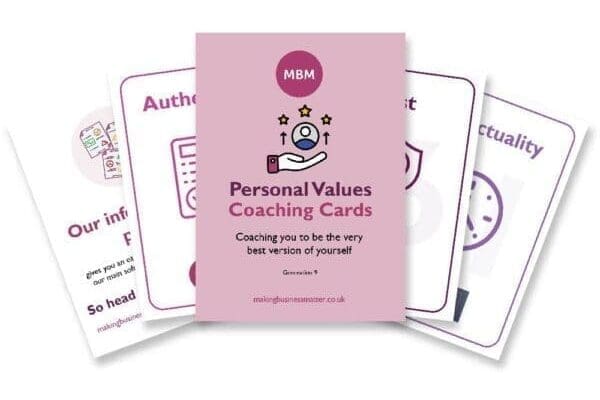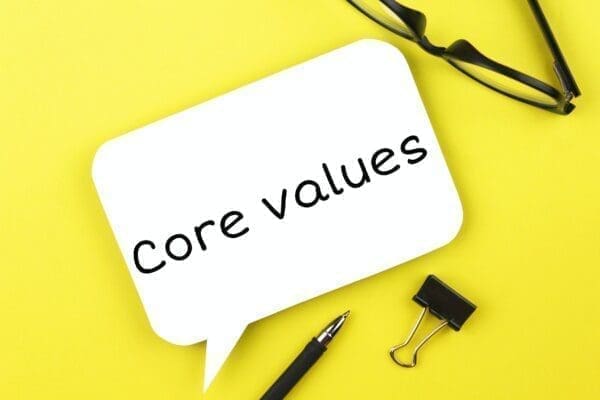Values, Ethics and Morals
Recently, I attended a lecture held by the ‘ethics advisor’ at my university. The lecture was a couple of hours long and, honestly, bored me to death. This guy went into in-depth detail on the difference between ethics, morals and the importance of values, and I am still not sure I understand. He covered a series of scenarios in which we had to decide whether we were dealing with ethical or moral issues. My overwhelming takeaway was that, for me, the difference didn’t really matter. Ultimately, you should do the right thing, right? Regardless of what kind of issue you’re dealing with, it should be dealt with by finding the best outcome.
My understanding of this lecture massively changed upon doing some research for this article. Of course, I researched values. What they are, the different types and the regard in which people hold them differently. This research showed me that, really, issues can be ethical or moral and the outcome rarely changes. My answers to these lecture scenarios were never based on the ‘type of issue’, they were based on the way I would choose to solve them – my values.

>> Personal values coaching cards <<
The Importance of YOUR Values
One of the scenarios was; if you’d employed freelance workers for a 2-day film shoot, you technically are not responsible for configuring their break schedule or giving them breaks at all. So, would you choose to give them breaks? How often? How long? Is this an ethical or moral issue? My answer: I don’t really care whether it’s ethical or moral because my values suggest that it is unfair to disallow breaks from work. The workers may provide lower quality work without breaks. To me, it seemed like simple logic and when I researched values, this was confirmed. The values you hold in high regard, your core values, dictate decisions like this. My core value at work here would be respect. I hold respect for people in high regard as a value of mine and therefore I would choose to allow adequate breaks. Would you?
The Different Types of Values
I have discovered three main types of values: individual values, relationship values and societal values. There is plenty of cross-over between the three as they all work together to create each person’s set of values. Imagine them as simply as a huge list of words; respect, love, power, authority, trust, kindness… and the list goes on. Regardless of their category, each person has an order of this list.

Some will hold all the individual values higher on their list than others, this is an incredibly self-aware person who is independent but may struggle with compassion or other relationship values. Some hold all the societal values higher, this is someone who cares deeply about the world, its future and the environment and is likely willing to sacrifice their time and energy for the ‘greater good’. There are so many different variations of the order of this list but everyone has an order… most do not know what their order is.
Individual Values
These values are based on yourself. They dictate how you come across in your interactions with others and ultimately the pathways and journeys you choose to take through life. These are often held relatively high on the list for anyone. We naturally look out for ourselves using these values. The position of these values will likely fall as you move through life, however. A young man responsible for little else but himself, will likely not hold much in higher regard than his individual values. When he becomes a father, however, worrying about himself will grind to a halt. His relationship values now become much more important.
Sticky Learning ® is 7 times more effective than 1-day training courses. Plus, you will get a Chain of Evidence proving your Return on Investment. Discover soft skills training that changes behaviours long term.

OK, Activity Time…
Understanding values task – 1
Grab yourself a sheet of paper and a pen. Write down these five individual values:
- Reciprocity
- Power
- Self-Awareness
- Love
- Respect
Of course, there are plenty more individual values but these are chosen to give a more rounded view of these values as a whole.
Now, write this question at the top of the page: ‘Which values, when violated, make you most annoyed?’ This will help us determine the hierarchy.

Once you’ve set up the task, here’s how to do it: begin pitching each value against one another. For example, 1 vs 2, my answer would be reciprocity, so 1 wins. Whichever wins, then pitch that value against the next, so now I’d do 1 vs 3, 3 wins for me, so 3 vs 2. This is how mine looks:
1 vs 2: 1
1 vs 3: 3
3 vs 2: 3
3 vs 4: 4
4 vs 1: 1
1 vs 5: 5
5 vs 2: 5
5 vs 3: 3
(now 3 has already been pitched against everything else, so do the one that is left. 5 vs 4)
5 vs 4: 5
So, now we can see how many votes each of them got, the more ‘vs’ battles it won, the higher it is on your list. My list is now this:
- Self-awareness (3 votes)
- Reciprocity (2 votes)
- Respect (2 votes)
- Love (1 vote)
- Power (0 votes)
What Does This Teach Us?
From this, I can devise that I value my self-awareness very highly and my power rather low. I know that mutual respect and reciprocity are very important to me. I rarely give effort to things and people that do not show the same back, this matters a lot to me. These are the sorts of discoveries you (hopefully) have made through this exercise. There is always a chance that you want to re-order this list. Maybe power was number 1 with almost all the votes, is this a good thing for you? Does your desire for power hinder you in certain situations? It’s all food for thought, but you can definitely make changes if you’ve realised that maybe your list is not how you wanted it to look.
Relationship Values
Of course, rather self-explanatory, your relationship values are the ones that affect the people around you. Partners, family, friends, and co-workers. These values are largely based on reciprocity, it’s a mixture of how you feel you should act towards a friend or partner and how you feel they should be acting towards you in return.

Once Again, Activity Time…
Understanding values task – 2
Begin with a new sheet of paper and write down the following relationship values across the top of the page:
- Communication
- Trust
- Generosity
- Empathy
- Commitment
On your page, order these values from most important to least important based on what you expect or want from a partner, friend or relative. My order looks like this:
- Commitment
- Trust
- Empathy
- Communication
- Generosity
Now, you have a choice. Reorder the list yourself from what you believe is your best attribute, to your worst. The other option – get a friend or relative to complete it for you based on what they think. You will probably get a more accurate response with the latter. I asked a roommate to do mine, this was his order for me:
- Generosity
- Commitment
- Trust
- Empathy
- Communication
Compare!
Now, compare the list. Do they match? Do you embody what you desire from others? The results can be interesting. Generally, for me, things aren’t too far apart but there is not a single value sitting in the same spot. I am clearly more generous than I would expect or want from others. Giving more than I receive is something I value highly and it is nice to see this reflected in these lists. I’m definitely not as great with communication as I’d like to believe and yet I clearly hold this in high regard in expectations from others.
Perhaps I need to work on this. The point is that, if your lists match almost completely, then you are the friend you’d like to have. If they are all out of whack, then perhaps you do not embody your perfect friend or partner. This does not have to be a negative outcome, keep this in mind. Opposites attract after all. Review your lists and identify what you would like to work on.
Societal Values

These values can be tough to recognise. It’s easiest to recognise it in someone that holds them in particularly high regard, likely over some individual and relationship values – a climate change ambassador, for example. These values include the following:
- Freedom
- Justice
- Sustainability
- Environmental Awareness
- Future (of society)
OK, Just One More…
Understanding Values task – 3
OK, so the task is to take your individual values from earlier and write them again, then write these societal values next to them. You should have two lists of values. Score them each out of ten, ten being for the values you hold in extremely high regard, little else beats them. One is for the values you really couldn’t care less about. Each list should get an overall score out of fifty available points. This is what my list looks like:
Societal
- Freedom – 10
- Justice – 7
- Sustainability – 6
- Environmental Awareness – 6
- Future – 8
Overall – 37/50
Individual
- Reciprocity – 7
- Power – 5
- Self-awareness – 9
- Love – 9
- Respect – 8
Overall – 38/50
It’s clear here that my values are not weighted particularly towards the individual side, which is an outcome I would expect from a lot of people. One I expected from myself, to be honest. The point of this is to determine how highly you value the ‘greater good’ of society versus how highly you value these things within yourself. A score ratio that leans heavily towards your individual values may mean that you are simply not too bothered with the values of the society in which you live – something you may want to address.
A score ratio that leans heavily towards your societal values may mean that you are incredibly selfless, a great attribute that can also hinder your self-care. Your score ratio says something about you that is completely open for interpretation. After all, it is your interpretation of all of these values that make up how highly you regard them and, thus, your actions that are based on them.
Why Do Values Matter at Work?
The application or importance of these values at work is just as significant as elsewhere in your life simply because they are non-circumstantial. Your values are part of you and this carries through to your workplace.

Individual Values
Your individual values affect a plethora of work-related things. How you feel at work, how you progress, the work you choose to take on and the efforts you choose to apply in each of your tasks. Values like respect are important at work because it is a professional environment. The respect you command as well as the respect you give to others is a paramount part of your working life. Your self-awareness value matters when working in teams. Others value your self-awareness as well as their own. It’s what helps you understand how to be part of a team. Being self-aware is what makes you work in that team and this is a value held at high regard by most.
Relationship Values
Your relationship values have more obvious importance at work since you spend so much time working with others. The relationship between you and your boss is built on values of respect, commitment and trust. These must be mutually valued between you and your authorities for a good working relationship. Your co-workers will all value their relationships at work differently. You will tend to get on with the ones that have similarly ranking relationship values. It’s tough to get along with someone who has drastically different values than you. A co-worker that lacks good communication and doesn’t seem to be worried about it is not a person who will be easy for someone that relies heavily on excellent communication to get along with.
Societal Values
Societal values are incredibly important for the bigger picture of your work. They affect things like the future of the company, the way they choose to market and advertise, the types of resources they choose to use. Company values have the potential to create a synthesised working environment where everyone is on the same page. A fairtrade foods company will rely heavily on its employees having strong societal values. It requires passion for the cause to work well at a company like this. The future of a company depends heavily on its societal values, especially in the age of ‘cancel culture’.
Summary of The Importance of Values
Your values are what make you who you are. The importance of them is equal to the importance of every decision you make, every day. Sometimes it is useful to lay them out and see where your values sit on the sliding scale. Perhaps these exercises have confirmed what you knew about yourself, or perhaps they have revealed things you didn’t know you cared about. Revisit these tasks every once in a while and check your values. It may just influence the best pathway you can take.




